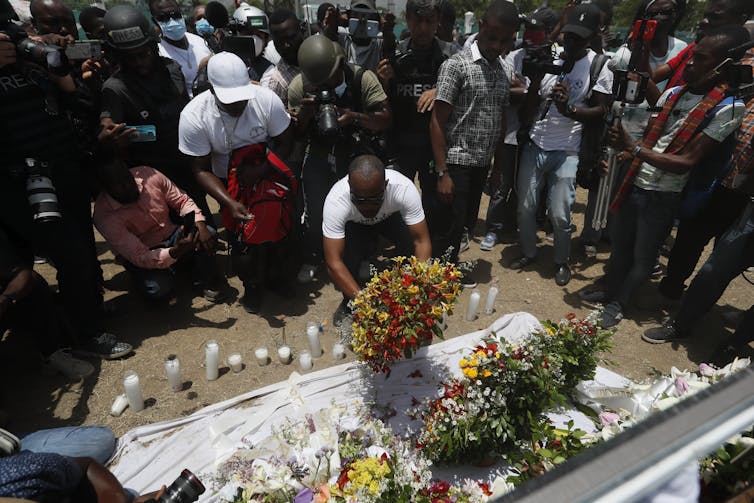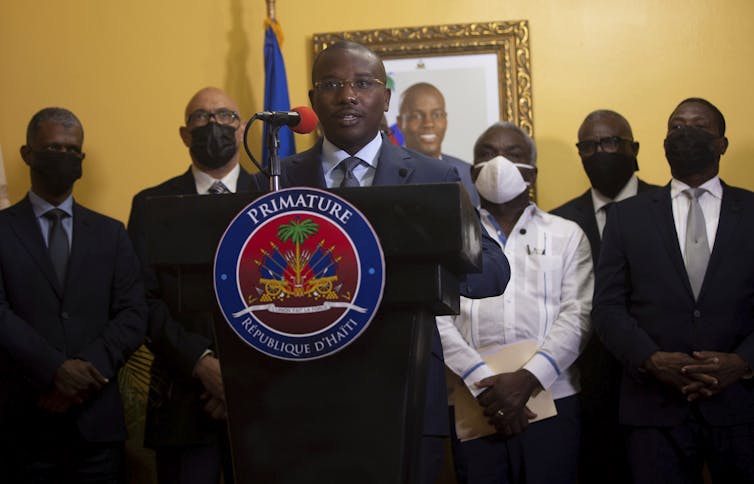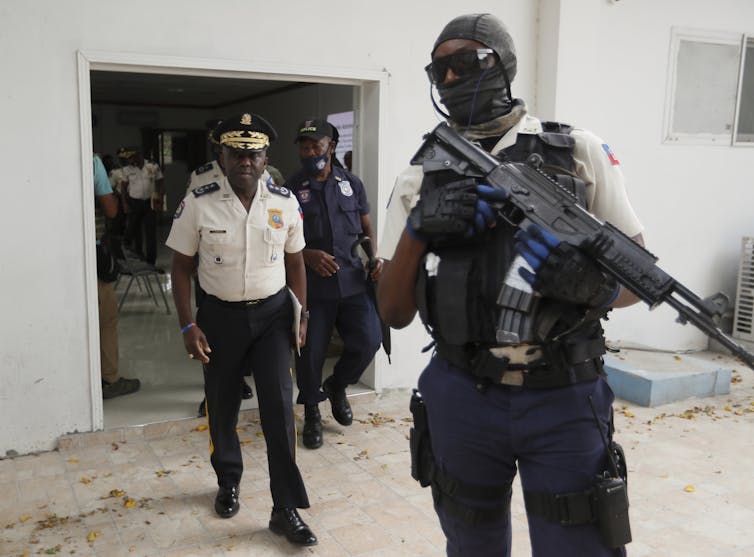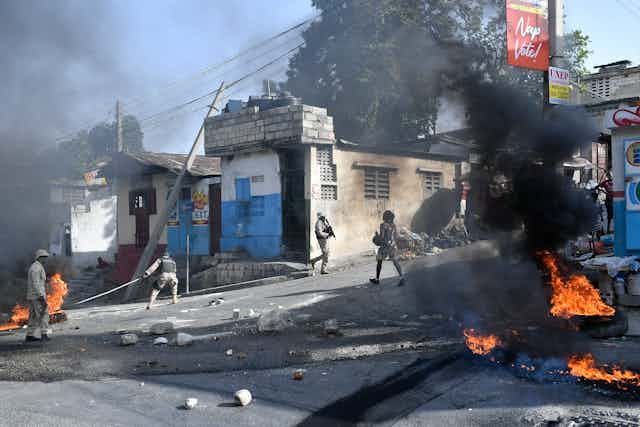The assassination of Haitian President Jovenel Moïse sent shock waves throughout the region and around the world. The circumstances surrounding the assassination remain unclear, although everything suggests it was an inside job supported by players from Florida acting with Colombian mercenaries in a complex network of sophisticated and well-organized political banditry.
I’m originally from Haiti and hold a doctorate in political science, a master’s degree in international relations and a diploma in international law from the International Institute of Social Studies in The Hague. I teach international relations at the Université du Québec à Montréal and I previously worked in the political affairs department of the Haitian Ministry of Foreign Affairs.
Calls for international aid
Internally, Haiti has been weakened for many years by a deep social and political breakdown, a deterioration of the economic and humanitarian situation and a generalized pattern of violence that has eroded the entire social and environmental fabric of the country.
When the health risks exacerbated by the COVID-19 pandemic are combined with the increased capacity of armed violence by organized gangs and the total collapse of Haiti’s armed forces, the result is an explosive cocktail waiting for a spark.
There have been many calls for a “robust” and “definitive” international response to the crisis in Haiti.

In the July 9 edition of the Miami Herald, columnist Andres Hoppenheimer implored U.S. President Joe Biden to assume leadership of a new UN force in Haiti. In Hoppenheimer’s view, this force would have “extensive powers and capabilities to prevent once and for all this cycle of violence and a new migration crisis in the region”.
Roberto Alvarez, minister of foreign affairs of the Dominican Republic, the country that shares a border with Haiti, mentioned the danger of a “somalization of Haiti that could affect the peace and security of the region as a whole.” Alvarez was referring to the catastrophic situation experienced by Somalis during a civil war that pitted different armed factions against each other and from which the country has not been able to recover to this day.
Even Haiti’s mysterious provisional prime minister, Claude Joseph, is appealing for foreign intervention. Overwhelmed by the events, he has requested that American soldiers and UN peacekeepers be sent to Haiti.
Void unfilled since the departure of the UN
The high degree of internal disorder in Haiti is motivating the new interventionist stances. The departure of the UN military forces in 2017, which coincided with the coming to power of Moïse in Haiti and Donald Trump in the United States, created a security vacuum that has not yet been filled. The fact that gangsterism has become a feature of daily life in Haiti is also a concern.

Given how acute the situation is, and how few resources the Haitian state has to deal with the crisis, many assume the immediate solution would require the re-engagement — either extensive or limited — of UN forces under the political umbrella of the U.S.
The United States, which is responsible for the Haiti dossier at the UN Security Council, has been the country’s guardian power par excellence since it invaded and subsequently occupied the country in 1915. It remains the ultimate arbiter and decision maker in disputes between Haiti’s different protagonists.
Biden has stated he “has no plans to provide military assistance at this time.” Short of a hypothetical Chinese-American partnership forming on the Haitian file at the Security Council, it’s difficult to imagine the international organization embarking on new military operations in Haiti.
An external solution to an internal problem
While UN military intervention may seem very appealing to uninformed observers, it would sustain the myth of an external solution to an internal, age-old problem.
Read more: After its president was assassinated, Haiti needs international help more than ever
At the same time, the current dynamic confirms the United States in its role as Haiti’s guardian power. The situation offers the opportune pretext and timing for providing a path forward on the ground, and for bringing Haiti back into the liberal democratic project that Washington and the United Nations have been carrying out in perfect synergy.
The failure of the democratic stabilization project
Since the invasion that followed the occupation of 1915-1934, the United States has had total control over the Haitian political space. This situation has been reinforced by the political and economic control exercised by Washington over international organizations and the wave of UN peace missions that has swept through the country since 1991.
The appointment of the American Helen La Lime as head of the United Nations Integrated Office in Haiti attests to the perfect fit on the ground between U.S. interventionist policies in Haiti and the institutional arrangement offered by the UN in Washington for this purpose.

But the current catastrophic situation in Haiti is in part a reflection of the failure of the liberal project of democratic stabilization in the country. The assassination of the president followed by the general uncertainty surrounding the country’s future trajectory show the conventional model and strategies that were put in place until now have exhausted their potential.
Helping Haiti find its own model
Mobilizing the same old policies would only amplify the chaos, further discredit external actors and increase internal rivalries. Too often the answers and solutions to the longstanding Haitian crisis have been thought of from the outside. This situation is humiliating and degrading for the very people who pioneered the freedom of black slaves in the world.
It’s urgently necessary to make a paradigm shift and put an end to this external shock therapy that has failed to generate a new social contract in Haiti and bring the country the prosperity it has been promised.
Of course, there is no guarantee that uniquely Haitian solutions will bring the long hoped-for peace. But there is a narrow window of opportunity here.
For too long the Haitian people have been treated as passive actors in solutions that come from the outside. It is time to put aside this interventionist model, which has only accompanied the destruction of the national social fabric, in order to help Haitians put their own model in place.


